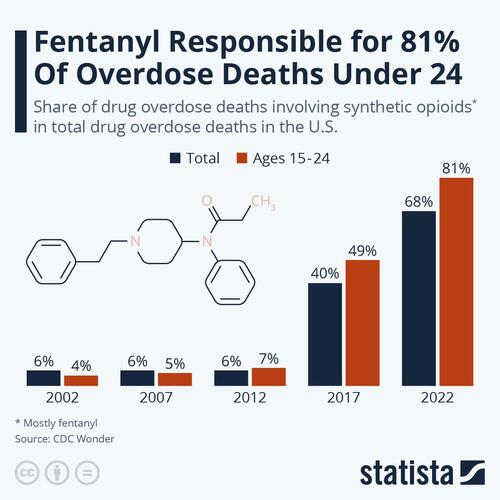
In 2022, an estimated 292 million people worldwide were using illegal drugs, with 60 million consuming opioids such as morphine, codeine, or heroin, according to the latest United Nations World Drug Report. This makes opioids the second most widely used class of illicit drugs, trailing behind cannabis, which has approximately 228 million users.
While cannabis use is more widespread and carries a relatively low risk of addiction, it does not result in overdose deaths. The same cannot be said for the far more potent and dangerous class of opioids. As highlighted in the latest data from the Centers for Disease Control and Prevention (CDC), synthetic opioids like fentanyl have become the leading cause of the rising number of drug overdose deaths.
Of the nearly 108,000 recorded overdose deaths in 2022, almost 74,000 were directly linked to synthetic opioids, with fentanyl being the most prevalent. Fentanyl is said to be 50 times more potent than heroin and has become a preferred choice for illegal drug manufacturers due to its ease of production and low cost, unlike traditional opioids that rely on crop cultivation. The impact is even more severe among younger populations. In the 15 to 24 age group, 81 percent of the 6,696 overdose deaths in 2022 were attributed to synthetic opioids, with related fatalities increasing fivefold from 2015 to 2022.
On a global scale, opioid use has remained relatively stable since 2019, with reported users even decreasing slightly from 62 million in the year before the coronavirus pandemic. According to data from the United Nations Office on Drugs and Crime (UNODC), the global prevalence rate of opioid use was 1.2% in 2022. However, certain regions reported significantly higher rates: 3.2% in the Near and Middle East/South-West Asia, 2.7% in North America, and 2.0% in Australia and New Zealand.
While cannabis use continues to dominate in terms of sheer numbers, the stark difference in overdose risks highlights the urgency in addressing the ongoing opioid crisis, particularly the lethal threat posed by synthetic variants like fentanyl.
As visualized by Statista:
In 2022, an estimated 292 million people worldwide were using illegal drugs, with 60 million consuming opioids such as morphine, codeine, or heroin, according to the latest United Nations World Drug Report. This makes opioids the second most widely used class of illicit drugs, trailing behind cannabis, which has approximately 228 million users.
While cannabis use is more widespread and carries a relatively low risk of addiction, it does not result in overdose deaths. The same cannot be said for the far more potent and dangerous class of opioids. As highlighted in the latest data from the Centers for Disease Control and Prevention (CDC), synthetic opioids like fentanyl have become the leading cause of the rising number of drug overdose deaths.
Of the nearly 108,000 recorded overdose deaths in 2022, almost 74,000 were directly linked to synthetic opioids, with fentanyl being the most prevalent. Fentanyl is said to be 50 times more potent than heroin and has become a preferred choice for illegal drug manufacturers due to its ease of production and low cost, unlike traditional opioids that rely on crop cultivation. The impact is even more severe among younger populations. In the 15 to 24 age group, 81 percent of the 6,696 overdose deaths in 2022 were attributed to synthetic opioids, with related fatalities increasing fivefold from 2015 to 2022.
On a global scale, opioid use has remained relatively stable since 2019, with reported users even decreasing slightly from 62 million in the year before the coronavirus pandemic. According to data from the United Nations Office on Drugs and Crime (UNODC), the global prevalence rate of opioid use was 1.2% in 2022. However, certain regions reported significantly higher rates: 3.2% in the Near and Middle East/South-West Asia, 2.7% in North America, and 2.0% in Australia and New Zealand.
While cannabis use continues to dominate in terms of sheer numbers, the stark difference in overdose risks highlights the urgency in addressing the ongoing opioid crisis, particularly the lethal threat posed by synthetic variants like fentanyl.
As visualized by Statista:
Loading…







